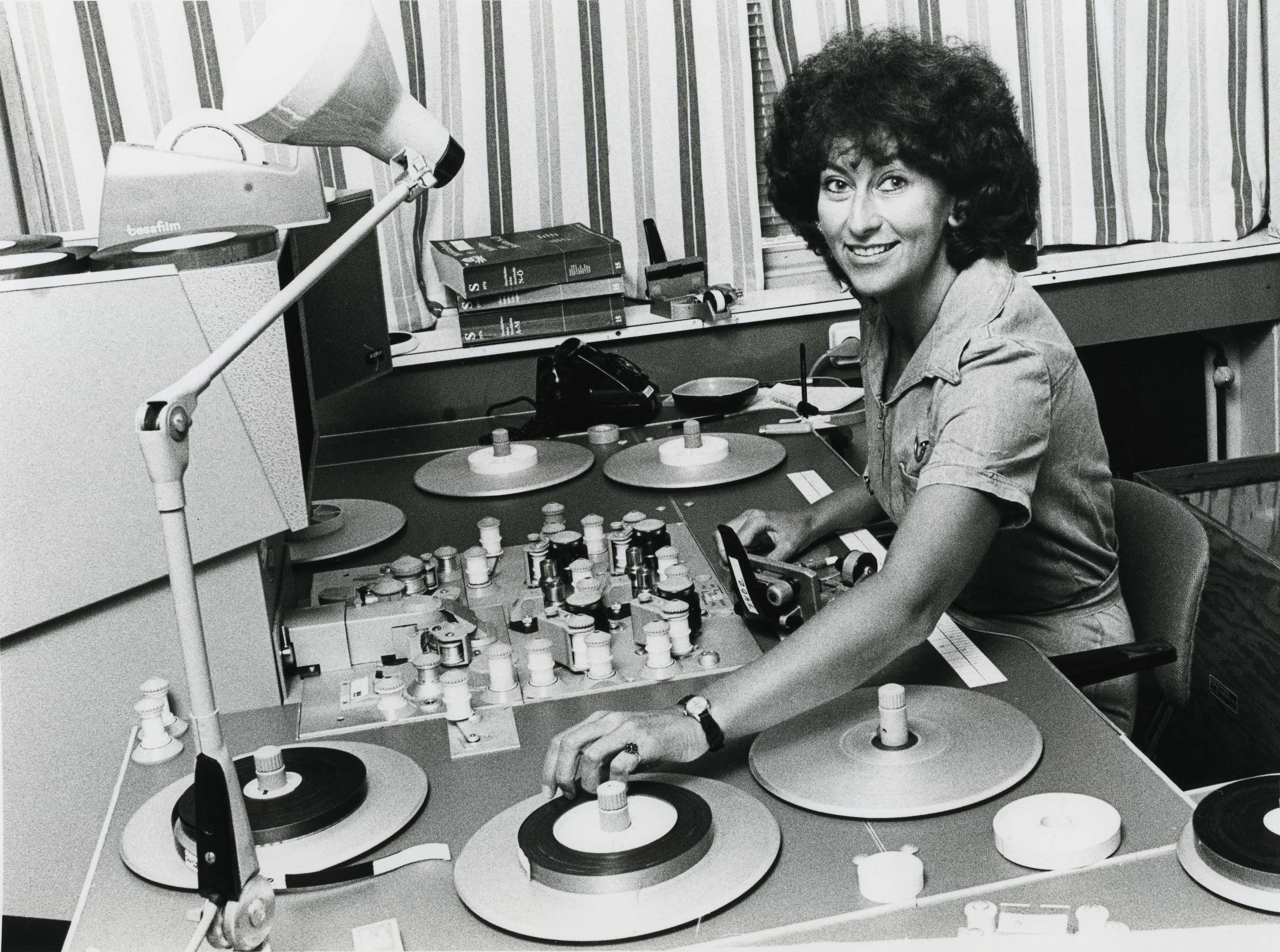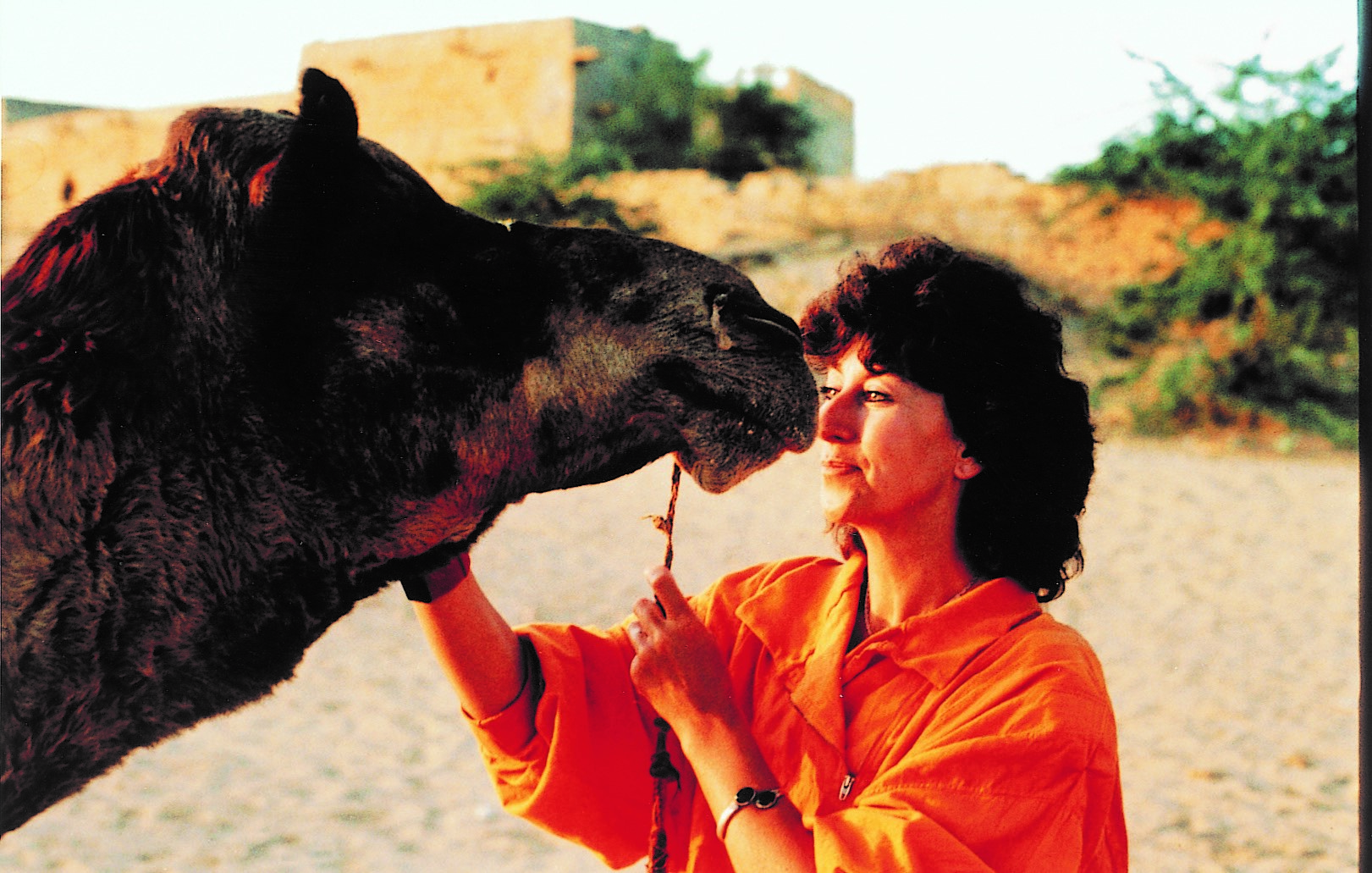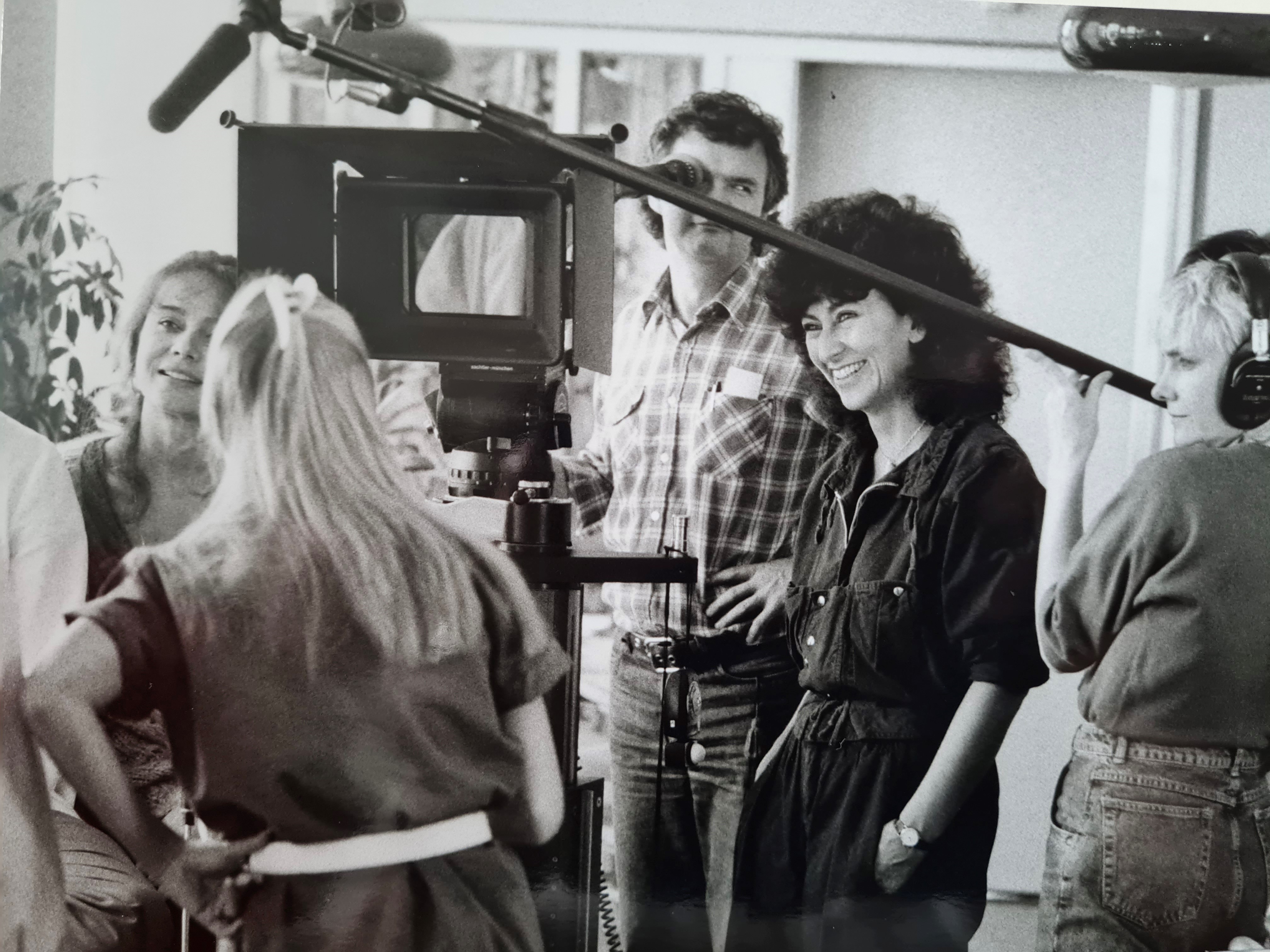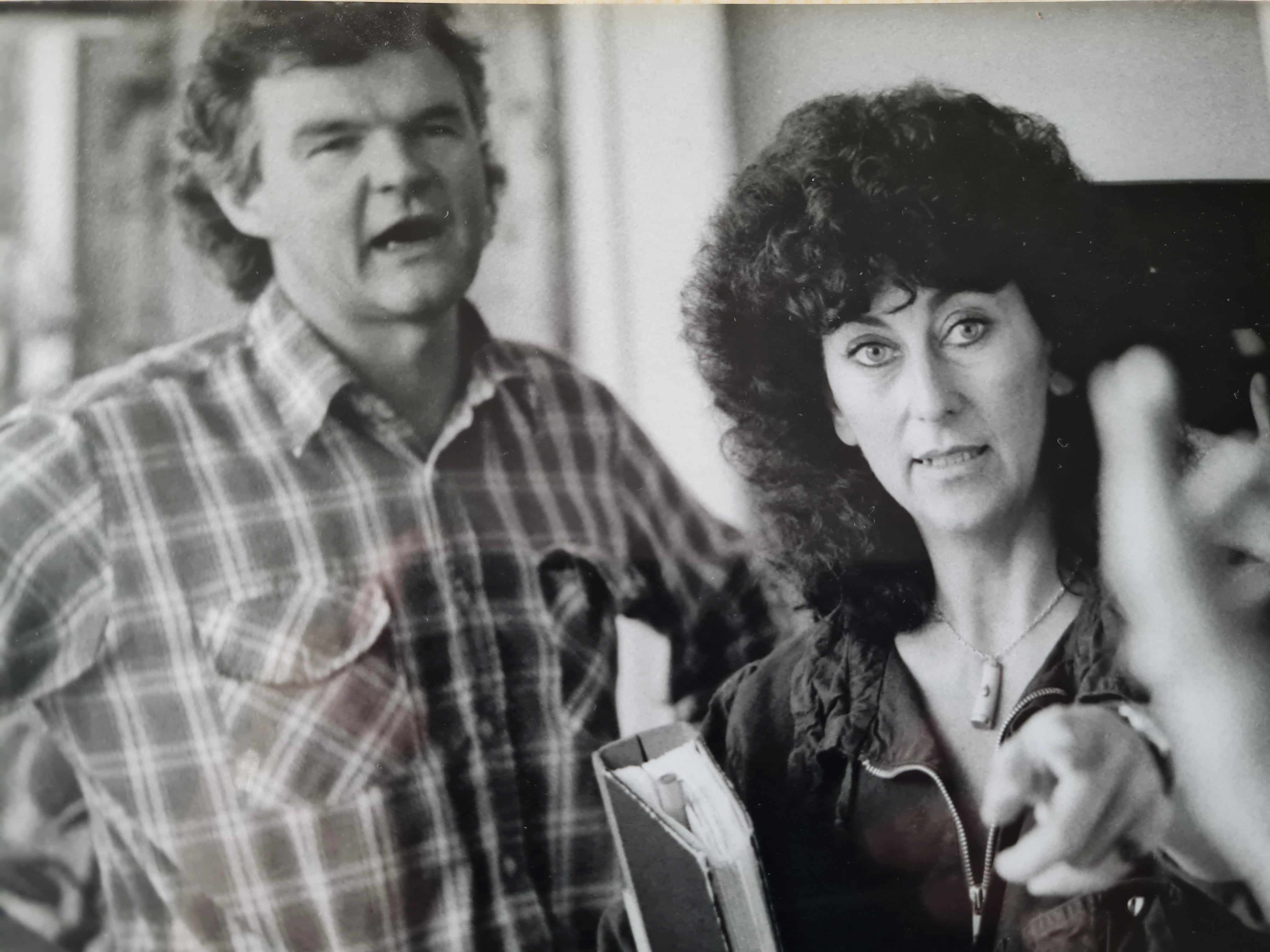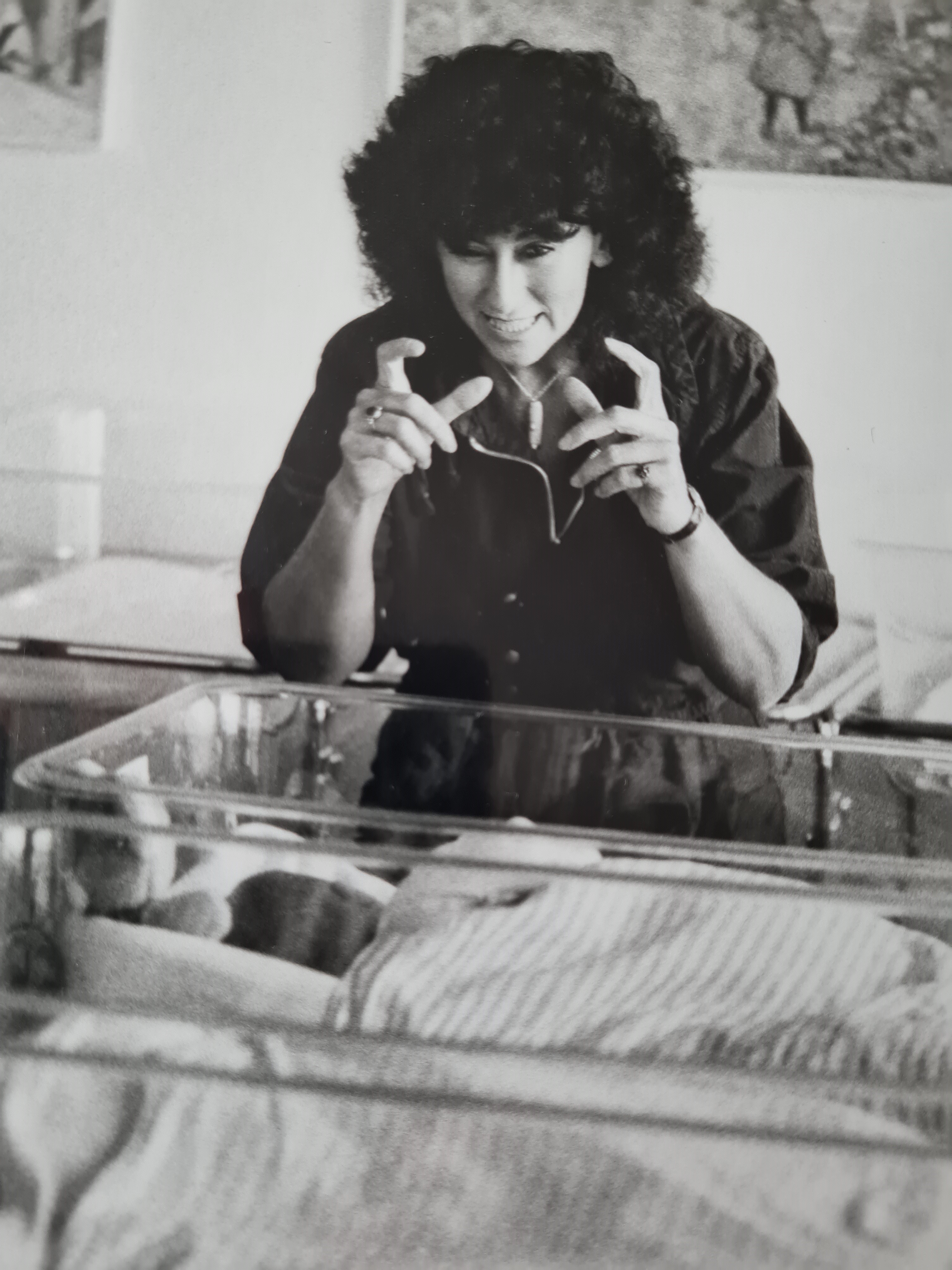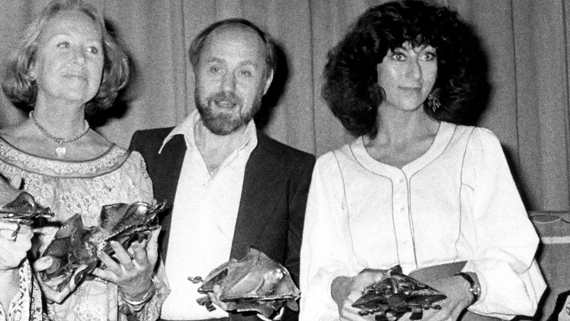Marianne Ahrne was born in Lund but grew up with her grandparents in Falköping. She saw her mother only at Christmas and midsummer. She first met her father, a Czech war refugee of Jewish origin, when she was seventeen. The awareness of having roots in two different cultures grounded a yearning to get away – subsequently expressed in a life of travel and adventure.
The yearning for freedom, for adventure and for cinema and literature has characterized her life. At the age of eighteen, after having flunked her graduation, she escaped to Paris with two hundred Swedish crowns in her pocket. She had long been a staunch Francophile. The year after and with her graduation now completed, she received a scholarship to a girls’ college in the United States with a focus on English literature, French and drama. The seed of a writing activity of her own hade been sown and was encouraged by an influential teacher in creative writing. After the end of the academic year, she travelled the USA and supported herself by writing articles for the Femina magazine and the local Falköping newspaper, where she wrote film criticism during her high school years – something she later continued doing in the Swedish film magazine Chaplin.
After returning to Sweden, she began studying at Lund University, where she also acted and directed at the student theatre and with the independent theatre group Proteus. In 1965 she took her philosophy master’s degree, and in 1966-1967 she became the first amanuensis at the Umeå University, where she taught French. But the dream of being creative had taken shape. A short film idea led her to apply to the Swedish Film Institute’s two-year film school program at the age of 27. There she made, among other things, the short film Från ett avlägset land (”From a distant country”, 1968).
During the early 70s, Ahrne made a number of short films, such as Balladen om Thérèse (”The Ballad of Thérèse”, 1970), Illusionernas slott (”Castle of Illusions”, 1970), Den siste riddarvampyren (”The Last Vampire Knight”, 1972) and the 45-minute film – Fem dagar i Falköping (”Five Days in Falköping”, 1975). She filmed the Danish Odin Teatret’s performance Ferai (1970) for Italy’s RAI and for the Swedish television project Världen i focus (”The World in focus”) she did case documentaries about abortion in France and divorce in Italy, both in 1971. The documentary feature Promenade au pays de la vieillesse / Promenad i de gamlas land (”A walk in the land of the old”, 1974) was shot in collaboration with Simone de Beauvoir, on whose essay The Coming of Age / La Vieillesse this was based.
Ahrne made her long fiction feature film debut with Långt borta och nära (”Near and far away”, 1976). The film is about Mania, a young woman who has recently finished her education and starts working in a mental hospital where she meets a patient who has stopped speaking. It will change her life. The critics described Ahrne’s filmmaking as aesthetic and mature. Aftonbladet ‘s Jurgen Schildt drew parallels to Bergman and One Flew Over the Cuckoo’s Nest, and Ahrne was the first woman to be awarded the Guldbagge national film award for best director in 1977.
She followed up this success with Frihetens murar (“The Walls of Freedom”, 1978). The story of the immigrant Sergio, who tries to find his way in the Swedish mental climate, received a slightly cooler reception. “A lively but somewhat fragmented experience,” wrote among others Expressen’s Lasse Bergström. The film was entered at festivals in Moscow and Toronto. In all of her films, she has also done the editing.
For television, Ahrne wrote and directed the youth drama Den tredje lyckan (”The third happiness”, 1983), a six-part series, before returning to the feature film format. In På liv och död, (“A Matter of Life and Death”, 1986) we meet Nadja (Lena Olin), a successful reporter in love with a married man, a doctor in a maternity ward, where she has chosen to do a reporting job, mainly to be near him. Svenska Dagbladet’s Elisabeth Sörenson found it to be a beautiful and brave film with the ambition to portray love. At the same time, she lamented that the balance between heat and coolness, between strong emotions and crystal-clear thought and between sensuality and aestheticism suffered from an imbalance.
Ahrne returned yet again to television with the series Flickan vid stenbänken (“The girl on the stone bench”, 1989), loosely based on Maria Gripe’s books, dealing with isolation, sibling relations and secrets in a castle setting. In the mini series Maskrosbarn (“Dandelion child”, 1989), Ahrne drew on autobiographical material about growing up and coming out stronger on the other side. The series won the Silver Nymph for best mini series in the fiction category for both screenplay and direction at the Monte-Carlo Television Festival 1990.
Ahrne, the adventurer and world traveller has visited most continents. In Kamelresan (“The camel journey”) from 1989, she describes how she buys a camel that she trains and competes with in the great annual camel race in Jaisalmer, Rajasthan. The impressions have been elaborated in books such as Äventyr, vingslag (“Adventures, beatings of wings”, 1992) and Jag har hört kamelerna sjunga (“I have heard the camels sing”, 2004), where she recounts her travels in Africa, including a 600 kilometre camel caravan with the Tuareg through the Niger desert – or in radio programs such as Voodoo, vildar och varulvar – en resa i Haitis inre (“Voodoo, savages and werewolves – A Journey into the inner Haiti”, 1985).
Already back in 1969, right after finishing film school, the head of the school Harry Schein had told her that she would find it difficult to make films because she did not fit into the spirit of the times.
– You are interested in people and relations, he said, not in political slogans.
This desire to go her own way, and to be an individualist beyond the politically correct, was a topic Ahrne wrote about in Svensk Tidskrift in 1999 – a choice of path that hasn’t always been unproblematic. In conjunction with the documentary Gott om pojkar, ont om män? (“Plenty of boys, shortage of men?”, 1995), where she, together with the physician and psychoanalyst Rigmor Robert, reasons around archetypal motifs around general human fantasy patterns about male figures in folktales and myths, opinions diverged. Dagens Nyheter‘s Helena Lindblad found the work to be a brave film that dared to polarize gender roles and question accepted truths about men and women from the perspective of both genders without having to question the achievements of feminism in the process. Others, however, accused Ahrne of espousing outdated ideals. With the release of the sequel, Flickor, kvinnor – och en och annan drake (“Girls, women and once in a while a dragon”, 1997), the debate became even more heated, and the film was considered by some social debaters as anti-feminist – and Ahrne was seen as a gender-unaware backward. At the same time, she herself has always wanted to be a free bird, beyond forced motherhood and designated female life.
In 2003, Ahrne was appointed feature film commissioner at the Swedish Film Institute. Some of the thirty films she supported were Sandor Slash Ida (2005) directed by Henrik Georgsson, Lena Einhorn’s Ninas resa (Nina’s Journey, 2005), Den bästa av mödrar (Mother of Mine, 2005) directed by Klaus Härö, Richard Hobert’s Harrys döttrar (Harry’s Daughters, 2005), Se upp för dårarna (Mind the Gap!, 2007), directed by Helena Bergström, Järnets änglar, (Black Island Sisters, 2007) directed by Agneta Fagerström-Olsson, and Jan Troell’s Maria Larssons eviga ögonblick (Everlasting Moments, 2008).
Ahrne’s Jewish origins have existed as an almost subconscious memory, something she channelled in the novel Katarina Horowitz drömmar (“Katarina Horowitz’s dreams”, 1991). The same is the case in Som en dotter (“Like a daughter”, 2001) a topical short film partly in Yiddish. It deals with memory and with language as a home.
Ahrne has also edited the script for the Israeli/Swedish/Hungarian production Gryningsfeber (“Dawn fever”, 2015), directed by Péter Gárdos, as well as helped develop the scripts for the blockbuster films about Arn: The Knight Templar from 2007-08. She has also competed twice (2018 and 2021) in the popular quiz show På spåret (“On track”), together with comedian Anders Ankan Johansson.
Louise Lagerström (2022, latest update by ed. 2022)
(translated by Jan Lumholdt, 2023)
Basic info
Main profession: Director
Born: 1940
Active: 1967-
Filmography
Regi:
Som en dotter (2021)
Fem över tolv (2000)
Flickor, kvinnor – och en och annan drake (1997)
Gott om pojkar, ont om män? (1995)
Jerzy Grotowskis Teatr Laboratorium (1992)
Resa i åskådarens inre (1991)
Rosenholm (TV-serie, 18 episoder, 1991)
Flickan vid stenbänken (1989)
Kamelresan (1989)
Santosh – ökenflickan (1989)
Anand – en pojke med två ansikten (1989)
Varsågod och rid! (1989)
Maskrosbarn (1989)
På liv och död (1986)
Wien – i skuggan av det förflutna (1986)
Den tredje lyckan (1983)
Svenska färger (1981)
Frihetens murar (1978)
Långt borta och nära (1976)
Fem dagar i Falköping (1975)
Promenad i de gamlas land (1974)
Drakar, drömmar – och en flicka från verkligheten (1974)
Jag gillar inte att leva ute i det fria (1972)
Schackspelet (1972)
Den siste riddarvampyren (1972)
Storstadsvampyrer (1972)
Varning för tjuren (1972)
Camargue – det förlorade landet (1972)
Abortfrågan i Frankrike (1971)
Italienska skilsmässor (1971)
Få mig att skratta (1970)
Balladen om Thérèse (1970)
Ferai (1970)
Illusionernas slott (1970)
Från ett avlägset land (1968)
Manus:
Som en dotter (2021)
Fem över tolv (2000)
Flickor, kvinnor – och en och annan drake (1997)
Gott om pojkar, ont om män? (1995)
Jerzy Grotowskis Teatr Laboratorium (1992)
Resa i åskådarens inre (1991)
Rosenholm (TV-serie, 18 episoder, 1991)
Flickan vid stenbänken (1989)
Kamelresan (1989)
Santosh – ökenflickan (1989)
Anand – en pojke med två ansikten (1989)
Varsågod och rid! (1989)
Maskrosbarn (1989)
På liv och död (1986)
Wien – i skuggan av det förflutna (1986)
Den tredje lyckan (1983)
Svenska färger (1981)
Frihetens murar (1978)
Långt borta och nära (1976)
Fem dagar i Falköping (1975)
Promenad i de gamlas land (1974)
Drakar, drömmar – och en flicka från verkligheten (1974)
Jag gillar inte att leva ute i det fria (1972)
Schackspelet (1972)
Den siste riddarvampyren (1972)
Storstadsvampyrer (1972)
Varning för tjuren (1972)
Camargue – det förlorade landet (1972)
Abortfrågan i Frankrike (1971)
Italienska skilsmässor (1971)
Få mig att skratta (1970)
Balladen om Thérèse (1970)
Ferai (1970)
Illusionernas slott (1970)
Från ett avlägset land (1968)
Produktionsledare:
Fem över tolv (2000)
Jerzy Grotowskis Teatr Laboratorium (1992)
Resa i åskådarens inre (1991)
Kamelresan (1989)
Santosh – ökenflickan (1989)
Anand – en pojke med två ansikten (1989)
Varsågod och rid! (1989)
Svenska färger (1981)
Promenad i de gamlas land (1975)
Drakar, drömmar – och en flicka från verkligheten (1974)
Jag gillar inte att leva ute i det fria (1972)
Schackspelet (1972)
Den siste riddarvampyren (1972)
Storstadsvampyrer (1972)
Varning för tjuren (1972)
Camargue – det förlorade landet (1972)
Abortfrågan i Frankrike (1971)
Italienska skilsmässor (1971)
Få mig att skratta (1970)
Balladen om Thérèse (1970)
Ferai (1970)
Illusionernas slott (1970)
Klippning:
Som en dotter (tillsammans med Håkan Bjerking, 2021)
Jerzy Grotowskis Teatr Laboratorium (1992)
Resa i åskådarens inre (1991)
Flickan vid stenbänken (1989)
Kamelresan (1989)
Santosh – ökenflickan (1989)
Anand – en pojke med två ansikten (1989)
Varsågod och rid! (1989)
På liv och död (1986)
Wien – i skuggan av det förflutna (1986)
Den tredje lyckan (1983)
Svenska färger (1981)
Frihetens murar (1978)
Långt borta och nära (1976)
Fem dagar i Falköping (1975)
Promenad i de gamlas land (1975)
Drakar, drömmar – och en flicka från verkligheten (1974)
Jag gillar inte att leva ute i det fria (1972)
Schackspelet (1972)
Den siste riddarvampyren (1972)
Storstadsvampyrer (1972)
Varning för tjuren (1972)
Camargue – det förlorade landet (1972)
Abortfrågan i Frankrike (1971)
Italienska skilsmässor (1971)
Få mig att skratta (1970)
Balladen om Thérèse (1970)
Ferai (1970)
Illusionernas slott (1970)
Från ett avlägset land (1968)
De rödas uppror (1973)
Ljudtekniker:
Drakar, drömmar – och en flicka från verkligheten (1974)
Roll:
Flickor, kvinnor – och en och annan drake (1997)
Gott om pojkar, ont om män? (1995)
Jag skall bli Sveriges Rembrandt eller dö! (1990)
Utan återvändo…? (1990)
Kamelresan (1989)
På liv och död (1986)
Den tredje lyckan (1983)
Långt borta och nära (1976)
Du gamla, du fria (1972)
Fanny Hill (1968)
Från ett avlägset land (1968)
Masturbationsdrama (1968)
Manusbearbetning:
Gryningsfeber (2011)
Arn – riket vid vägens slut (2008)
Arn – tempelriddaren (2007)
Filmkonsulent:
Watching the Moon at Night (2015)
Porträtt av en död (2011)
Blommorna i lägrets skugga (2010)
Varg (2008)
Maria Larssons eviga ögonblick (2008)
Kapten Ahab (2007)
Svarta nejlikan (2007)
Hoppet (2007)
Järnets änglar (2007)
Linas kvällsbok (2007)
Se upp för dårarna (2007)
7 miljonärer (2006)
Frostbiten (2006)
Heartbreak Hotel (2006)
Inga tårar (2006)
Min frus förste älskare (2006)
Moreno & tystnaden (2006)
När mörkret faller (2006)
Offside (2006)
Spelar du i kväll? (2006)
Wellkåmm to Verona (2006)
Den bästa av mödrar (2005)
Carambole (2005)
Den utvalde (2005)
Dråpet (2005)
Fyra veckor i juni (2005)
Halva sanningen (2005)
Harrys döttrar (2005)
Innan frosten (2005)
Kocken (2005)
Made in Yugoslavia (2005)
Mastermind (2005)
Miraklet i Småland (2005)
Mun mot mun (2005)
Ninas resa (2005)
Sandor /slash/ Ida (2005)
Stockholm Boogie (2005)
Vinnare och förlorare (2005)
Macbeth (2004)
The Queen of Sheba’s Pearls (2004)
Övrig medarbetare:
Ingas metamorfoser (1991)
Published works
Äppelblom och ruiner, 1980
Den tredje lyckan, 1983
Katarina Horowitz drömmar, 1990
Äventyr, vingslag, 1992
Och tänk den fagra prinsessan, 1994
Fader okänd, 1998
Lejon, kackerlackor och en mycket värdefull hund, 1999
Falköpings fångna leoparder, 2001
Jag har hört kamelerna sjunga, 2004
Awards
1990: Silvernymfen för bästa regi och manus vid Monte Carlofestivalen, Maskrosbarn.
1977: Guldbagge för Bästa regi, Långt borta och nära (första kvinna att erhålla Guldbagge).
1976: Kritikernas och publikpriset för bästa långfilm vid festivalen i Hyères, Frankrike, Promenad i de gamlas land.
1976: Kritikernas och publikpriset för bästa kortfilm vid festivalen i Hyères, Frankrike, Camargue – det förlorade landet.
